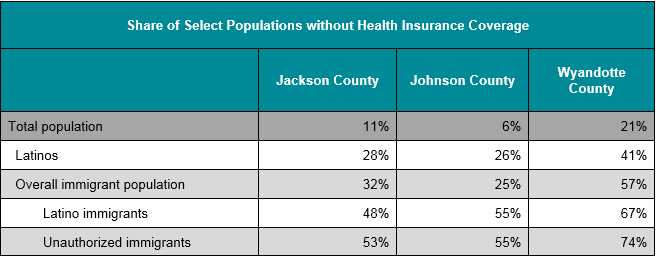Latinos & Immigrants in Kansas City Metro Area Face Higher Health Insurance Coverage Gaps, Even as They Represent Fast-Growing Share of Workforce
WASHINGTON — Latinos and immigrants are at least twice as likely to lack health insurance coverage as the overall population in three central Kansas City metro counties, a new Migration Policy Institute (MPI) study reveals. In fact, they are four times as likely to be uninsured in Johnson County, Kansas.
Overall, 161,000 residents in the three Kansas City metro counties with the largest immigrant populations—Johnson County; Jackson County, Missouri; and Wyandotte County, Kansas—are uninsured, with immigrants of all origins and U.S.-born Latinos accounting for 38 percent (61,000) of the total. MPI’s analysis draws on data from the U.S. Census Bureau, county health departments and local safety-net health-care providers.
The findings have significant implications because immigrants and Latinos form growing portions of the Kansas City area labor force and tax base, and their shares will only continue to rise amid anticipated declines in the native-born, non-Latino population. As a result, promoting their health and productivity through expanded health coverage and access to health care is a critical economic development strategy for Kansas City, researchers Randy Capps and Ariel Ruiz Soto argue.
“Given the important role immigrants and their U.S.-born children play in Kansas City-area communities and the future of the regional economy, it makes economic sense to maximize health insurance coverage for immigrant and Latino families,” said Capps, who is director of research for U.S. programs at MPI. “But because those who do not obtain health-care coverage will likely continue to rely on safety-net providers, it will remain important to ensure continued public and private support for these institutions.”
The issue brief, Health Insurance Coverage of Immigrants and Latinos in the Kansas City Metro Area, is part of a broader project between MPI and JUNTOS Center for Advancing Latino Health at the University of Kansas Medical Center. It offers a brief demographic profile of the immigrant and Latino populations in the three-county area, before examining their health insurance coverage and gaps.

Note: These populations are in some cases overlapping: Latinos can be U.S. born or immigrant, while immigrants include Latinos and other race/ethnic groups.
Source: MPI analysis of pooled 2014-2016 data from the U.S. Census Bureau’s American Community Survey, with legal status assignments using a unique MPI methodology developed in consultation with James Bachmeier of Temple University and Jennifer Van Hook of The Pennsylvania State University, Population Research Center.
Since implementation of the federal Affordable Care Act (ACA) in 2014, coverage has improved for many groups, including Latinos and immigrants, most strikingly in Wyandotte County. But these gains risk stalling or being reversed with the ACA narrowed by court rulings, congressional action and reduced enrollment outreach. Moreover, the new public-charge rule—which permits denial of green cards to immigrants who use Medicaid or might use it in the future—could deter many from enrolling in the program or accessing health care from public sources.
Expansion of Medicaid to low-income adults in Kansas and Missouri, as other states have done under the ACA, could extend coverage to an estimated 44,000 of the 161,000 uninsured residents of the three-county area, including 9,000 Latinos and 8,000 lawfully present immigrants.
With or without Medicaid expansions, many immigrants will remain dependent on safety-net providers in the Kansas City area—particularly unauthorized immigrants who are ineligible for almost all forms of public coverage. “This has real implications for how safety-net providers conduct outreach and deliver health care: it is essential to have cultural and linguistic competence to serve these communities,” said Ruiz.
Read the brief here: www.migrationpolicy.org/research/health-insurance-immigrants-latinos-kansas-city
###
The Migration Policy Institute (MPI) is an independent, non-partisan, non-profit think tank in Washington, D.C. dedicated to analysis of the movement of people worldwide. MPI provides analysis, development and evaluation of migration and refugee policies at the local, national and international levels. For more on MPI, please visit www.migrationpolicy.org.

